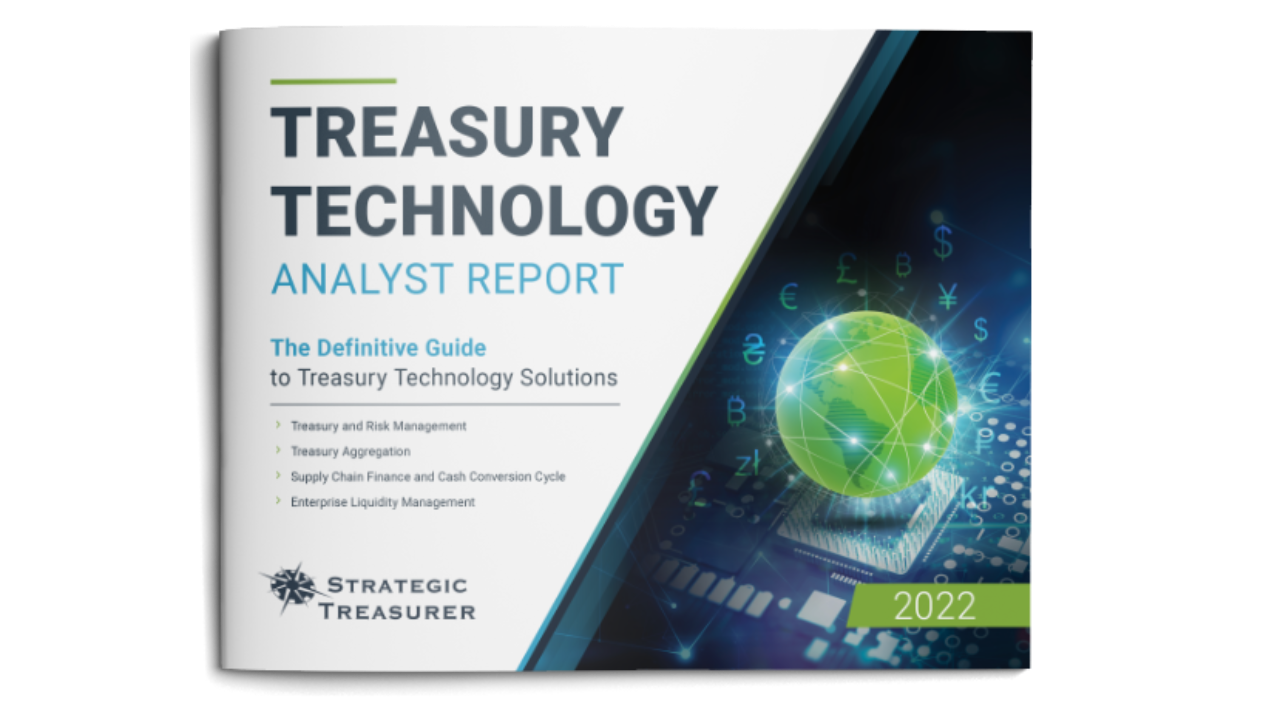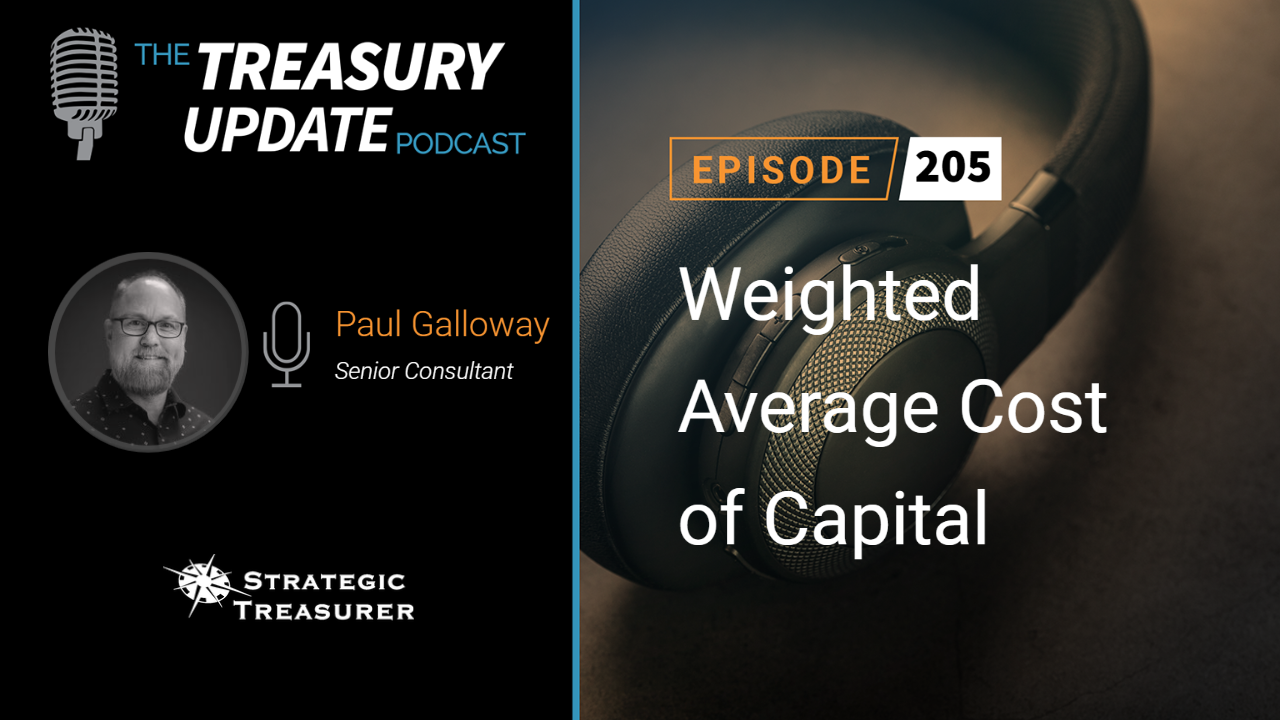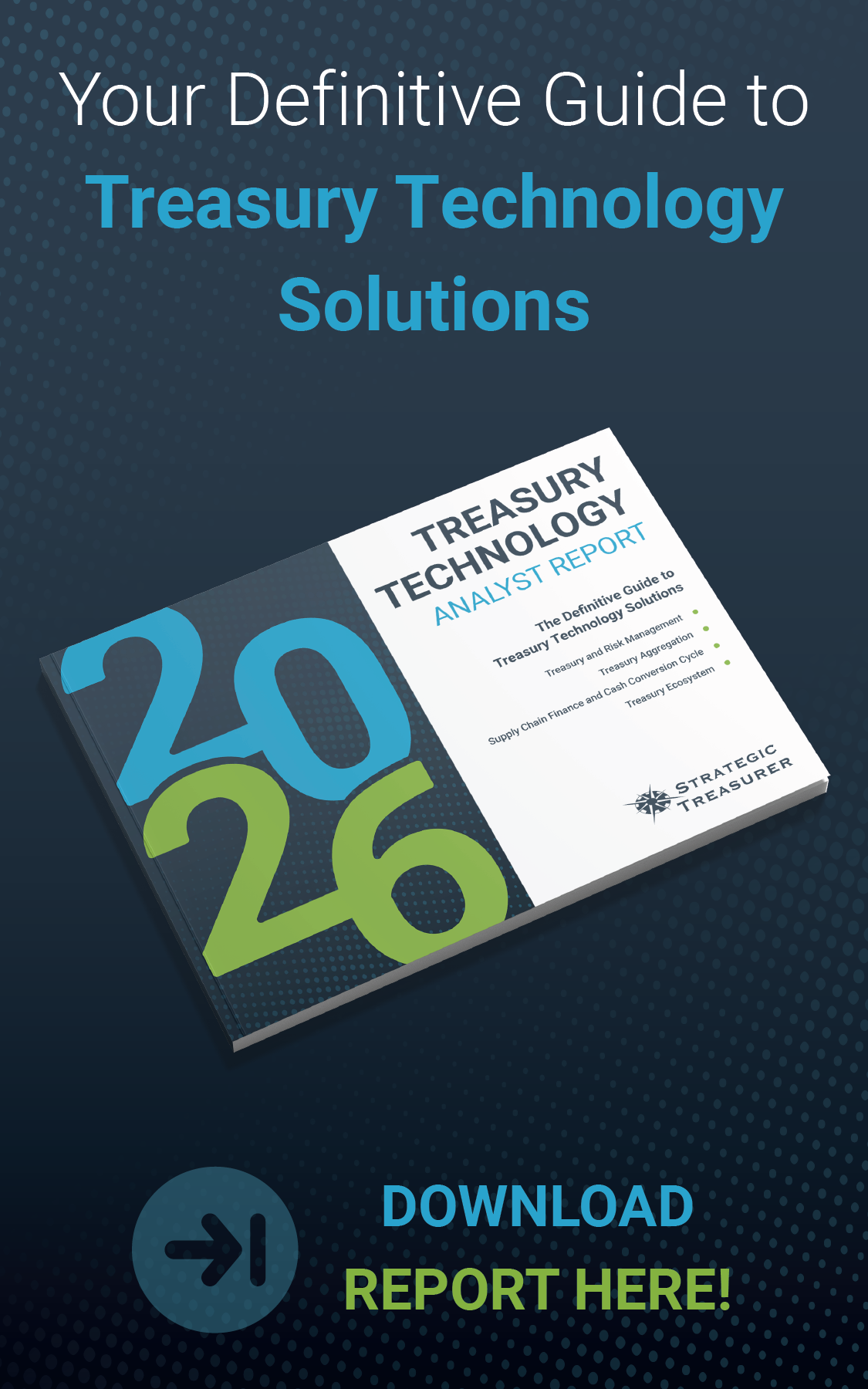
Episode 233
What Did Treasurers Learn from the Events of 2022?
The year 2022 was an interesting ride. Global turmoil, supply chain issues, rising interest rates, and major acquisitions all caused concern and intrigue for treasurers and financial professionals around the world. In this podcast, Craig Jeffery and Paul Galloway of Strategic Treasurer discuss some of the key events of 2022. Listen in and feel free to share your thoughts by sending us an email.
Host:
Craig Jeffery, Strategic Treasurer


Speaker:
Paul Galloway, Strategic Treasurer


Episode Transcription - Episode #233 - What Did Treasurers Learn from the Events of 2022?
Announcer 00:04
Welcome to the Treasury Update Podcast presented by Strategic Treasurer. Your source for interesting treasury news, analysis, and insights in your car, at the gym, or wherever you decide to tune in.
Craig Jeffery 00:18
Welcome to the Treasury Update Podcast. This is Craig Jeffery, your co-host today with Paul Galloway, who’s a senior advisor at Strategic Treasurer. We are discussing 2022: The Year in Review. Welcome back to the podcast, Paul.
Paul Galloway 00:34
Thanks, Craig. Good to be here. What an exciting year we had. Ups and downs, all kinds of things.
Craig Jeffery 00:39
And due to travel problems with due to weather you are in Atlanta in our studio in Peachtree City. This is our first the first podcast I’m recording sitting at the new booth. This is exciting for us. Probably means nothing to everybody who’s listening to this.
Paul Galloway 00:55
Yeah, no kidding. Oh, this is pretty cool. I really liked the room. This is definitely a step up for us.
Craig Jeffery 01:02
Let’s begin with technology, what’s going on with technology and 22? I’ll start us off. One of the big things happening in the year is some of these acquisitions, private equity firms acquiring companies. Thoma Bravo, acquired Bottomline technology some time ago, but recently acquired Coupa for $8 billion. That was just recently in announced in December. So this ongoing expansion and spending of money by private equity firms in the broader treasury space. This is something that’s a significant year for for acquisitions, despite some of the headwinds in the general economy.
Paul Galloway 01:40
Yeah, I think that’s absolutely right, Craig, I mean, P shops have been sitting on the sidelines for some years prior to recent years, with a lot of cash and looking for opportunities. And I think it’s really telling that we’re seeing in the treasury space, this investment by P shops, it bodes well for the industry to see that and they realize that it’s there are returns available out there in our industry is we continue to grow and expand in the demand for new technology, by organizations that are looking at the way they do things or have done things for a long time and saying, Hey, things have to change. How do we change that, and they’re approaching firms like ourselves to help them do that. And organizations that provide FinTech that support not only their position today, but growth for the future. So you can set up these systems and in organizations to grow along with them as, as they advance, it’s 5, 10, 15 years down the road, the technology is still there to support them in it’s growing with them along the way.
Craig Jeffery 02:55
Well, just like private equity firms making the the bet or the investment in some of these technology firms, because the current trajectory, the prospective earnings they expect from these acquisitions. So to our corporate treasury groups, corporate finance areas, whether it’s AP AR, as well as Treasury, they’re spending at an elevated level that has not diminished through 2022. So there’s been a period of multiple years where they’re spending above trendline, for treasury technology, payments are coming up again, quite heavily. So we continue to see that through our surveys and through our relationships with companies spend is good. And so those two things go lockstep investments in the space spent by corporations on all kinds of treasury risk transaction technology. So a couple areas there. The other thing on tech that I wanted to just point out briefly for the year and review, API use, as well as machine learning continues to grow faster than was expected a year and two years ago, and this is one of the few areas that exceeds what people say when they take surveys. Usually there’s a discount off it. People listen, as podcasts have heard heard of, say this number of times. I don’t want to belabor it, but there’s faster adoption than expected, and it’s almost always a discount on the expectation. So that’s another another area in tech, anything else on tech before we move on to the next topic?
Paul Galloway 04:20
No, I don’t think so. Craig, I think it’s I think you’ve pointed out some really important aspects in terms of what we’ve seen in 2022. You know, I can remember with API’s, it was a conversation four or five years ago, and today, it’s really become reality. Banks, FinTech providers are embracing it and corporate treasury units AP AR that are expecting the API’s are going to be utilized, as well as machine learning, the AI technology that’s becoming more and more important.
Craig Jeffery 04:55
It’s being used, like you’re saying, banks are offering it technology firms are offering it So through the platform, so the portals that exist, they’re been able to adopt it. They’re adopted more rapidly. I think that’s that’s been the leading cause for the faster adoption. These API first or API enabled platforms using what’s happening very much on the edge. There’s there are companies it’s more than the tip of the curve. Companies that are becoming API orchestrated companies where they don’t want to just pass files around, they’d rather have API’s be part of their orchestrated messaging, communication and updates through their internal systems. And so there’s a shift there. I think we’re very early on that. We don’t see that commonly. But we see that with some call it tech leaders. So I think we’re in the first year of where that’s, that’s becoming much more prevalent. I mean, companies have had API gateways for some time. All right, let’s shift to war and supply chain. There’s a war in Europe, Russia’s brutal attack on Ukraine, Ukraine’s strong battle back, this is a real significant event for treasuries in a number of areas, let alone the humanitarian, geopolitical aspects, what do we think about from a review perspective there?
Paul Galloway 06:10
What’s really interesting about this is that Russia went into this conflict, expecting that Ukraine was just going to fold. And that’s not what’s happened at all. In addition, I don’t believe that that Russia expected that they were going to get the support that they’ve been getting from the West, necessarily. Yeah, they’ve done things to try to deter that there’s been quite a bit of saber rattling in recent weeks around the use or potential use of nucular weapons if pushed far enough along. That’s definitely something you don’t want to hear. I don’t think anybody really wants to use those. But you never know. And you got to take that with a grain of salt. But it’s had a significant impact on Europe, and we’re going into the winter months, and supply chain for fuel is changed has been disruptive, because they relied on fuel from Russia for many of the countries in in Eastern Europe, or Western Europe. So I think this disruption definitely is going to be a challenge for them as they continue to go through the winter months.
Craig Jeffery 07:25
And he mentioned fuel. Obviously, there was, you know, the the energy impact on fertilizer, the impact on transportation has been significant. And you talked about the winter and obviously there’s the the issue of you know, are people going to freeze somewhere? Maybe that’s an obvious issue. I think there’s been quite a bit particularly in the your eurozone, countries planning for that trying to conserve store prepare for those things, there’s been, you know, cutting of old growth forests to you know, use things like wood for for energy. So I think that’s going to be a fairly impactful event for planning, you know, this the use of nuclear is that going to come back as a more sustainable, less dependent on on other suppliers, particularly countries like Russia, or Iran, in that case, a couple pieces on the the fuel, I would love to hear an economist who keeps track of the use of fuel of energy, how that changes during economic slowdowns. I think we, as a globe, we use just under 100 million barrels a day, somewhere in the 9798 range in the US has shifted from not 20 years ago, being a provider a net provider to a net user. Since the end of last year, the US has released I think it’s about 250 240 250 million barrels out of the Strategic Petroleum Reserve the strategic reserve largely keep prices down not because of you know an impact. But that has to lead up or it is letting up. It has to let up or past or past midterms, past runoff elections, and there’s not more, there’s not a lot to to be released. It’s fairly dangerously low. So replacing that’s gonna cost a lot that has kept price pressures down in the US a million a day. You know, I think we were were short three or three or 4 million a day this provided, you know, are having to import and this provided a million of their day is that is that going to rebound and cause a great increase since we’re stopping the release? The Yoast haven’t released right before winter, where there might be some heavy uses of it. I don’t know all the factors there. But those are things I’d love to hear from economists who look at that.
Paul Galloway 09:45
On the outside looking in, when you start reducing supply prices have got to go up as demand is going up for it. There’s just no two ways around it. So I expect that we’ll probably see an increase in prices. As you You said, I’d like to hear what economists are thinking. I imagined or thinking along those lines, but it would be good to hear that, you know, one of the other things that came out of we really didn’t hit on Friday, we hit I named energy. One of the other pieces, that was an issue, as well, it was around getting grain out of Ukraine. And so that was that was another piece, especially with Russia controlling waterways and the ability to distribute grain, you know, that created some supply issues as well in terms of feeding people around the world.
Craig Jeffery 10:37
All right, so moving off a war on oil, why don’t we look at let’s move to digital currency for a minute, it seems like digital currencies, particularly, some of the currencies have been dealt a significant blow to the head, from exchange impacts to FTX. To other issues. We see things like Bitcoin started out in the low 40s. Well, off their highs were now around 17,000 from the low 40s During the course a year, pretty big impact, a lot of concerns. This is not the end of digital currency, but it certainly has suffered some some pretty significant headshots. You know, if we’re going to use a sports metaphor there. Any other thoughts on what happened this year and where that’s going?
Paul Galloway 11:21
I think you could say, it’s not entirely surprising that there’s a disruption in this area, because it’s still fairly new digital currency, and the use of cryptocurrency, this is all continuing to evolve and grow. So I look at this as a significant growing pain. It’s not the end of crypto, it’s not the end of digital currency. It’s something that’s going to help, I think, make the industry better in the long run. But obviously, FTX was a big deal. You know, they’re calling a big one of the biggest frauds ever in the US. On the outside. It seems like, yeah, that’s what it was misuse of funds. There was things going on that shouldn’t have been going on, you know, it’s going to force regulators and lawmakers to say, Hey, we gotta get some rigor to this before it gets out of control again. So the question is, is, you know, who’s going to survive all of this? And what does digital currency look like going forward? Those questions still need to be answered. But I think in the long run, we’re going to find that there’ll be credibility to this platform, and it will continue to be used.
Craig Jeffery 12:38
So lightly paid, obey essence to talking about digital currency, cyber currencies, let’s talk about some of the increases increases in inflation increases and rates. What’s we’ve gone from pretty flat at the beginning a year on the Fed side for the the US central bank, approaching 5%, we’ve seen some pretty significant raises 75 basis points, most recent 150 basis points, inflation, certainly north of six, but sometimes over seven and a half over 8%. You know, some parts of Europe, the UK are higher. These certainly impact corporations, corporate treasury grips in terms of their planning cost of caustic apples more the volatility here is more on the pricing side. Any thoughts on the the year in review on time of rising, rising inflation, rising rates?
Paul Galloway 13:31
Yes, sir. Certainly challenging across the board. The Fed had to raise rates, in light of the inflation numbers we had, if they hadn’t done that there could have been some severe harm to the economy. And so they didn’t have a choice. They did what they’re supposed to do. That’s why the Feds employees do these kinds of things.
Craig Jeffery 13:52
I know we’re not really gonna get into second guessing them too much. But there’s quite a few say they’ve raised them too much. They raised them too fast.
Paul Galloway 14:01
Well, you can go back and look at the history of the Fed. And there’s been cases where they’ve overcorrected or under corrected. Meaning, they moved too quick, or they didn’t move quick enough. And history is going to tell us for sure. The one thing I can’t say is that inflation is coming down, which is a good sign. I still think there’s more pain to be had, we’re going to see more rate rises. And I think 2023 We’re going to see some economic challenges as a result of that. Until we get inflation to a point where it’s in the realm of what we’d normally expect it to be. I think there’s gonna be that question. Have they done too much? Or have they done enough?
Craig Jeffery 14:42
Would you agree that they started too late? All the talk about transitory for what seems pretty clear at this point? I think it seems pretty clear they started too late. They wouldn’t have had to bend so severe. If you think they did the right amount they would have had it been so severe if they started a little earlier.
Paul Galloway 14:58
I do believe they started too late. I think there was a hope that it was going to be transitory. But it wasn’t it clearly wasn’t.
Craig Jeffery 15:07
Saying transitory doesn’t make it so right.
Paul Galloway 15:10
Yeah, it doesn’t make it so. They started too late. I think there was opportunities to do some bigger rate hikes earlier. They didn’t. I think it’s playing catch up now. And so potentially what could happen is playing catch up results in you overshoot. Again, history is going to tell whether that’s true or not. I believe we could end up with a case that we overshoot, you know, and we do, I do believe we started too late.
Craig Jeffery 15:38
Two other topics. We’re trying to keep this this podcast short. Two other topics. On shoring the disruption in the supply chain, there’s more on shoring and friend shoring happening, it seems clear from every measure that’s occurring. That’s up, that’s become a theme and 2022. Would you agree that that’s a major theme or a just a start of a trend?
Paul Galloway 16:00
I think it’s potentially a start of a trend? I don’t know for sure. But when I think about relations with China, the disruptions in supply chains, I think it’s making everybody think, okay, that we put too much reliance on one thing versus another. So I feel like it’s a trend. I think it’s a trend where we’re going to start rethinking supply chain management. And where are we source things from, I expect that to continue in 2023. And for several years going forward.
Craig Jeffery 16:36
The last item is a result of a number of the other things that we spoke about was the FX volatility. We’ve seen weakening of the pound, the euro, there’s been some recovery in the last month or so of those currencies, significant volatility there that that’s been a more dramatic shift in impact for corporate treasuries this year than it’s been in some recent years, still, same defense, but you’re still taking out your insurance, so to speak on this, but this is a, this has been a significant thing in 2022.
Paul Galloway 17:08
It’s definitely been a bit of a wild ride, The dollar strengthened significantly over the last four months, I expect that if the Fed continues to do what they’re doing, we’re probably going to see some weakening in the dollar in the future. It’s been an interesting year for sure. Who would have thought we were gonna get the parity or with the euro for a long time we hadn’t been. And we reached that. It’s been an interesting year for sure. 2023, I expect that we’re going to see some perhaps equally interesting aspects around currency.
Craig Jeffery 17:46
Thanks for coming all the way down to the office with your flight delays so we could do this in person. Everyone who’s been listening to the Treasury Update Podcast this year and years prior. Thanks for, thanks for listening. We’re so excited that this year, we passed over 300,000 downloads, well over 300,000 downloads through the life of the podcast. That’s that’s both encouraging, and exciting. So feel free to share it. If you like it, like the podcast, go ahead and rate it on whichever channel you’re using that helps identify it and bring it up to others. So Paul, thank you and everybody who’s listening thank you have a great New Year.
Announcer 18:24
You’ve reached the end of another episode of the Treasury Update Podcast. Be sure to follow Strategic Treasurer on LinkedIn. Just search for Strategic Treasurer. This podcast is provided for informational purposes only, and statements made by Strategic Treasurer LLC on this podcast are not intended as legal, business, consulting, or tax advice. For more information, visit and bookmark StrategicTreasurer.com.
Subscribe to the Treasury Update Podcast on your favorite app!
Related Resources
Researching new treasury and finance technology can be overwhelming. Strategic Treasurer has stepped in to help. Explore our definitive guide to the treasury technology landscape and discover detailed, data-based coverage of each area.
Weighted Average Cost of Capital
A firm’s debt and equity are important components when investors are watching. What is the cost to fund your operations? What costs are required to make investments or develop new products? In this podcast, Craig Jeffery and Paul Galloway of Strategic Treasurer discuss your WACC or Weighted Average Cost of Capital.








